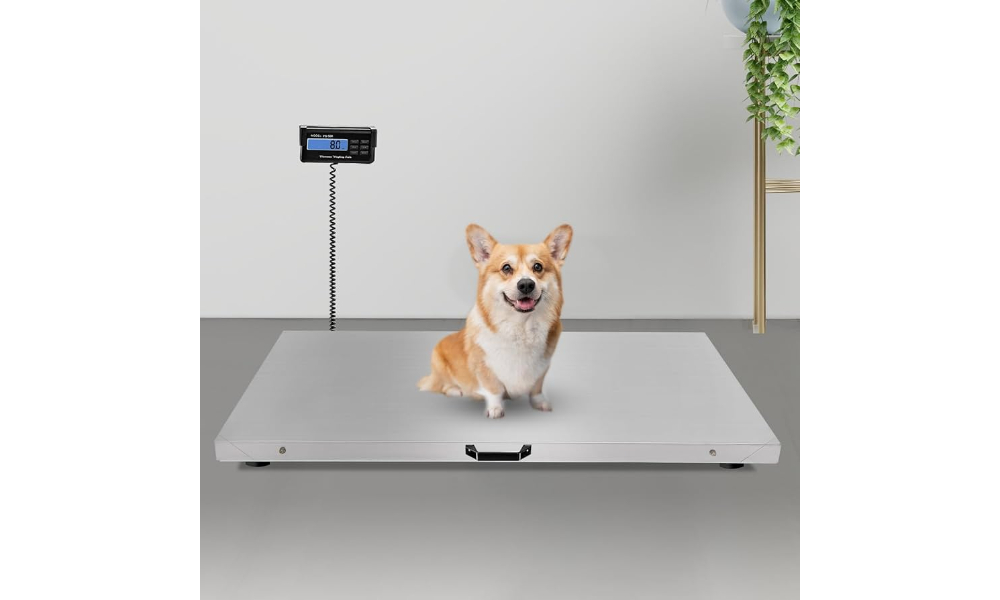Managing chronic illness in pets can be a daunting task, requiring constant monitoring and vigilant care. Whether it’s diabetes, kidney disease, arthritis, or heart problems, keeping track of a pet’s health is essential for maintaining their well-being and adjusting treatments as necessary.
One powerful tool that often goes overlooked is the use of digital floor scales.
Though commonly used in human healthcare and industrial settings, floor scales offer a unique and beneficial way for pet owners and veterinarians to monitor the weight of pets with chronic conditions.
In this article, we’ll explore how floor scales can play a critical role in managing chronic illness in pets, improving their quality of life, and providing actionable insights into their health.
1. Tracking Weight Fluctuations
One of the primary benefits of using a floor scale is the ability to track weight changes in pets. Weight fluctuations can be one of the most obvious signs of a health issue, particularly for animals suffering from chronic illnesses.
For pets with conditions like diabetes, kidney disease, or cancer, consistent weight monitoring is crucial. In some cases, significant weight loss may signal worsening health, dehydration, or poor nutrient absorption. Conversely, weight gain might indicate fluid retention, a common issue in pets with heart disease or kidney problems.
By regularly weighing your pet, you can catch these signs early, allowing for prompt intervention and adjustments in their treatment plan. Many floor scales come with memory features that allow you to track and compare measurements over time, giving a clear picture of how the pet’s weight is evolving.
2. Managing Medication and Diet Adjustments
When treating pets with chronic illness, medication and dietary changes are often necessary. However, adjusting dosages or the types of food a pet receives requires careful consideration of their weight and overall health. A floor scale can help pet owners and veterinarians make these decisions based on precise measurements.
For example, if a pet’s weight decreases despite an increase in food intake, this could suggest that the food isn’t being properly digested or absorbed, prompting a change in the type of food or a switch to higher-quality nutrition. Alternatively, pets on medications that may cause fluid retention, such as those for heart failure, can benefit from regular weighing to monitor for excessive weight gain.
In cases like diabetes, maintaining a pet’s weight within a healthy range is crucial for stabilizing blood sugar levels. By closely monitoring their weight, you can work with your vet to tailor their diet and medication to prevent unwanted side effects, such as hypoglycemia or hyperglycemia.
3. Reducing the Stress of Regular Vet Visits
Chronic illness often requires frequent veterinary visits for check-ups, blood work, and treatment adjustments. For pets, visiting the vet can be a stressful experience, especially for those with long-term health problems. The constant transportation and handling can be tough on pets, particularly elderly or fragile animals.
By investing in a floor scale for home use, you can monitor your pet’s health without needing to make frequent trips to the vet for weight checks. This is particularly useful for pets with arthritis or joint pain, as the less they have to be handled, the more comfortable and calm they will remain.
Additionally, having regular weight data at hand makes vet visits more efficient, as you’ll have a clearer picture of your pet’s health between appointments.
4. Supporting Mobility and Joint Health
For pets suffering from arthritis or other musculoskeletal problems, maintaining a healthy weight is essential for managing pain and improving mobility. Excess weight puts added pressure on joints, exacerbating the symptoms of arthritis and potentially leading to further complications.
Floor scales are especially useful for monitoring the weight of aging pets or those with chronic pain. By regularly weighing your pet and ensuring they stay within an optimal weight range, you can reduce unnecessary strain on their joints and help keep them more comfortable.
For pets that are already on a treatment plan for joint health—whether it’s medication, supplements, or physical therapy—having a heavy duty weighing machine at home ensures that you can track progress and see if weight management is supporting their overall recovery.
5. Prevention of Secondary Conditions
Chronic illnesses often lead to secondary conditions that can complicate a pet’s health. For example, pets with diabetes are more likely to suffer from obesity, and those with kidney disease may experience fluid retention, leading to weight gain.
Floor scales allow for the regular monitoring of weight, which can provide early warning signs of secondary issues. For instance, an unexpected weight gain could be a sign of fluid buildup in a pet with kidney disease or heart failure, while weight loss could indicate an inability to absorb nutrients properly. In both cases, being able to detect these changes early can help prevent further complications and allow for prompt intervention by a veterinarian.
6. Convenience and Ease of Use
Floor scales are easy to use and can be placed in your home, allowing for regular, stress-free weigh-ins at your convenience. Many pet owners find that these scales are particularly useful for pets that are difficult to handle, as they can step onto the scale without needing to be picked up or restrained. Some floor scales even come with features like easy-to-read digital displays and memory functions that store previous readings, making it easy to monitor trends over time.
These scales are also often larger and more stable than traditional pet scales, which can be intimidating or unstable for pets. A sturdy, flat surface ensures that your pet can comfortably stand on the scale for accurate measurements.
7. Tracking Treatment Progress
For pets undergoing treatment for chronic illnesses, it’s essential to monitor how well they are responding to therapy. Weight tracking offers valuable insight into whether a treatment plan is effective. For example, a pet with cancer undergoing chemotherapy may experience significant weight loss, while one being treated for heart disease may show gradual weight gain due to fluid retention.
Using a floor scale to track weight regularly can give both owners and veterinarians a clear indicator of how the pet’s condition is progressing. If the weight is stable or improving, it may indicate that the current treatment regimen is effective. Conversely, unexpected weight fluctuations may suggest the need for adjustments in their care plan.



